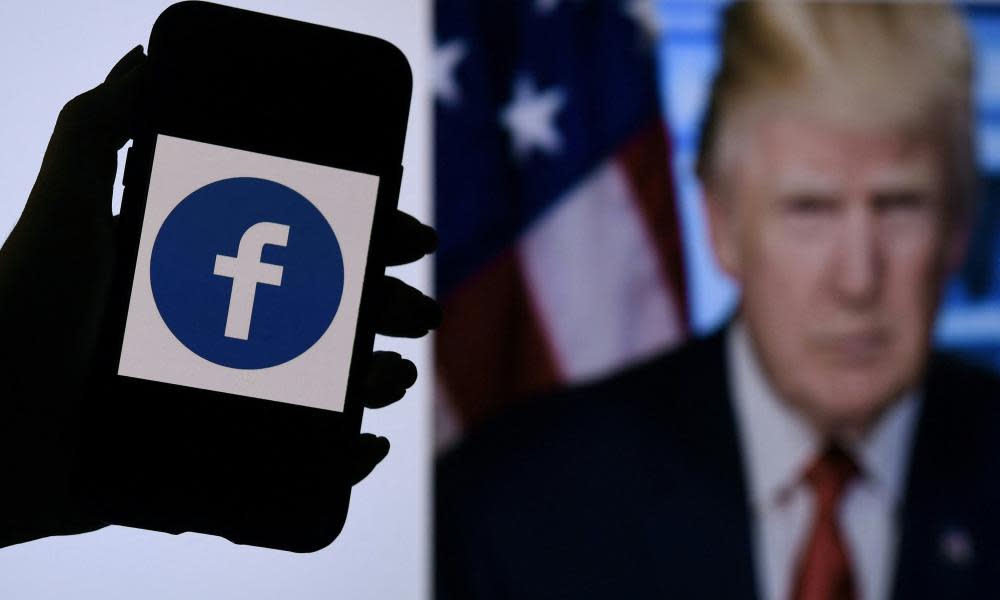Facebook ruling on Trump renews criticism of oversight board

- Oops!Something went wrong.Please try again later.
Facebook’s oversight board on Wednesday ruled that Donald Trump’s Facebook account should not be reinstated. But it stopped short of making a final decision, saying Facebook itself must decide what to do with the former president’s account. The move has deepened questions over the oversight board’s effectiveness.
Trump has been exiled from the platform since January over posts in which he appeared to encourage the rioters who stormed the US Capitol. Trump petitioned Facebook to reinstate his account, and the social media giant punted a decision on his fate to the oversight board, which has now punted the decision right back to Facebook.
Related: Facebook ruling on Donald Trump ban: five key takeaways
The ruling announced on Wednesday was watched closely by tech critics and advocates, marking one of the first times such a large tech platform has publicly made a crucial, public decision regarding who gets to use its platform to speak.
Activists who had discouraged Facebook from allowing the return of the president say the announcement underscores failures of the oversight board, a regulatory group that was formed in 2020 to make decisions independent of Facebook’s corporate leadership.
“Instead of addressing the core problems in its platform, [Facebook] exploited this fragile moment in our society in order to sell us the fiction of this oversight group,” said Angelo Carusone, president and CEO of Media Matters for America. “Don’t buy it. Now, they’re kicking the can down the road again.
“Unless Facebook permanently bans Trump immediately, we will be having this same dramatic sideshow in six months from now,” he added.
Activists have said Facebook has a responsibility to ban Trump, whose activity on the platform – from lies about the election to calls for violence against peaceful protesters – they say is dangerous to democracy. In addition to the Capitol riot posts that led to the ban, Trump made hundreds of false statements about Covid-19 and other issues, analyses show.
In an analysis of Donald Trump’s posts between 1 January 2020, and 6 January 2021 when he was banned from the platform, the non-profit advocacy group Media Matters for America found that Trump pushed misinformation about Covid-19 and election fraud or violent rhetoric attacking his critics in more than 1,400 separate posts – more than a quarter of his total posts during that period.
The scale of Trump’s coronavirus misinformation makes the decision to remove him particularly important at this moment in the pandemic, said Jessica J González, the co-chief executive officer of the non-profit anti-hate speech organization Free Press.
“Given Trump’s history of spreading pandemic disinformation, it’s particularly crucial to deny him a megaphone at a time when we’re still struggling to contain the virus and increase vaccinations.”
The oversight board includes high-profile members, such as the former Danish prime minister Helle Thorning-Schmidt, the Columbia law professor Jamal Greene and the former Guardian editor Alan Rusbridger.
The Real Oversight Board, a group of activists formed as a critique of Facebook’s oversight board, said members of Facebook’s board should step down from the group “for their own dignity”.
“What is the point of the oversight board?” the activist group said. “This is a Facebook-funded, Facebook-appointed body that has no legitimacy to make real decisions. Facebook’s attempt to divert attention from its fundamental failure to take responsibility for what’s on its own platform has itself failed.”
The oversight board before Wednesday’s decision had made a handful of smaller, less high-profile choices. Facebook has repeatedly said it allows posts from influential users like politicians to remain online even if they violate policy because of their newsworthiness. But the oversight board said Facebook should “publicly explain the rules that it uses when it imposes account-level sanctions against influential users”.
“Heads of state and other high officials of government can have a greater power to cause harm than other people,” the board said in its explanation of the decision. “If a head of state or high government official has repeatedly posted messages that pose a risk of harm under international human rights norms, Facebook should suspend the account for a period sufficient to protect against imminent harm. Suspension periods should be long enough to deter misconduct and may, in appropriate cases, include account or page deletion.”
Activists have pointed out other platforms, including Twitter and Snapchat, banned the former president outright without taking such pains to explain themselves. González said that the oversight board’s decision announced on Wednesday does not address many of the issues activists have brought up regarding hate speech and misinformation on Facebook.
“Mark Zuckerberg designed the oversight board to deflect attention from the structural rot at the heart of Facebook’s hate-and-lie-for-profit business model,” she said. “Facebook’s content moderation efforts are dysfunctional by design. The tech giant earns revenues by engaging people in hate.”
González added that what is truly needed to rein in Facebook’s issues with hate speech is action from legislators – a measure that seems inevitable as executives have faced a record number of hearings in Congress over the past year.
“Until national and global institutions rein in Facebook, the company will continue to profit from spreading inflammatory political rhetoric and disinformation that target communities confronting oppression across the country and around the world,” González said.

